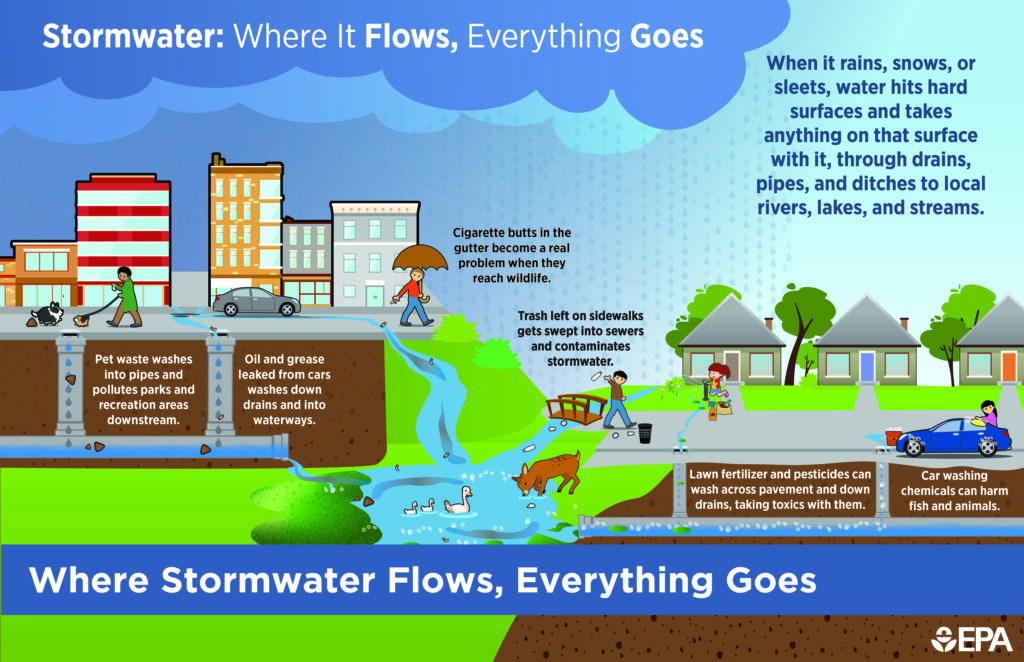What Is MS4?
- Stormwater runoff from snowmelt or rain can pick up pollutants such as motor oil, lawn chemicals, and pet waste before entering streams untreated.
- Large amounts of untreated water entering the storm sewer system, and eventually our streams, have lasting health, safety, environmental, and economic impacts on our community.
- Polluted stormwater runoff is commonly transported through Municipal Separate Storm Sewer Systems (MS4s), where it is often discharged untreated into local waterbodies.
- To prevent harmful pollutants from being washed or dumped into the stormwater system, Maidencreek Township was required to obtain an NPDES permit from the PA Department of Environmental Protection and develop a stormwater management program.
- The township has developed a Public Education and Outreach Plan as well as a Public Involvement and Participation Plan to help share the significance of keeping stormwater clean and preventing pollution in our streams.
Below, you will find some public outreach resources regarding stormwater, source water protection, and MS4.

What Can You Do?
- Dispose of motor oil at a garage that will recycle it. Never pour oil on the ground or in a storm drain in the street.
- Pump out your septic system every two or three years (more on septic systems below).
- Bring household hazardous waste like oil-based paint, varnish, chemicals, and pesticides to the Berks County Household Hazardous Waste Drop-Off Days. Check their website for the next scheduled day.
- Minimize the use of pesticides and herbicides on your lawn and gardens.
- Do not dump swimming pool water into a creek or storm drain at the end of the season. Wait until the chlorine diminishes, then direct pool water into grass, woodland, or other natural areas.
- Remember – anything you throw or store on the ground can find its way into the water supply. Store and handle chemicals properly.
- Do not let grass clippings, leaves, and other waste enter storm drains
NOTHING IN THE DRAIN BUT RAIN!
REPORT ILLEGAL DISCHARGE TO THE TOWNSHIP OFFICE AT
610-926-4920
Helpful Projects
How often do you think about the water that runs off your roof? Have you ever considered creating a rain collection system for stormwater? During a storm, the ground can become oversaturated, and water runs directly to the streams. What we want to happen is for all the water to enter into the soil. Soil naturally filters so it can return clean water to the watershed. One way to decrease runoff is a rain barrel. By setting one of these up to your downspout, you can redirect some of the water to a barrel. You can then use the water for gardening or return it to the soil on a dry day.
Another system that helps is a rain garden. This is an aesthetically pleasing approach that can be as elaborate as you like. The principle is to lead the drainage water from the downspout to a garden that can help the soil absorb and filter the water. As an example of a more complicated garden, you can create a small basin and designate rings of soil to plant in. The innermost ring contains plants that need the most water and the outer plants need the least.
Both of these methods are tried and true and can help make a small improvement to our water supply. If they sound interesting, there are many online resources that go over different approaches to these projects.
Septic System
Do you have a septic system on your property? As of 2023, there are 396 septic systems in Maidencreek Township. Unlike public sewers, these systems cannot be actively monitored and maintained by the township. If you do have a septic system, make sure that it is inspected and pumped every 3 years. Tanks left unchecked leave a chance of unsafe water for use and drink. It is also recommended to take proper records of maintenance. Sometimes septic tanks are partially buried or not specified when a property changes hands, increasing the risk toward your health and potentially damaging the septic tank. Proper maintenance every 3 years is safer and cheaper than waiting for a septic system to fail entirely.
For a more detailed description of how to maintain your On-Lot Disposal System, you can view this guide here from the Pennsylvania Septage Management Association which explains in detail.
Relevant Documents
- Caring for Streamside Property
- MS4 Annual Report 23-24
- MS4 Annual Report 24-25
- Pollution Reduction Plan
- Proper Disposal of General and Hazardous Waste
- Total Maximum Daily Load Plan
- Septic System Care and Maintenance
- Swimming Pool Water Disposal Guidelines
- When It Rains It Drains
- Public Education and Outreach Plan
- Public Involvement and Participation Plan
